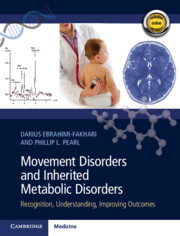Book contents
- Movement Disorders and Inherited Metabolic Disorders
- Movement Disorders and Inherited Metabolic Disorders
- Copyright page
- Dedication
- Contents
- Contributors
- Preface
- Acknowledgments
- Section I General Principles and a Phenomenology-Based Approach to Movement Disorders and Inherited Metabolic Disorders
- Chapter 1 Treatable Metabolic Movement Disorders: The Top 10
- Chapter 2 The Importance of Movement Disorders in Inborn Errors of Metabolism
- Chapter 3 The Importance of Inborn Errors of Metabolism for Movement Disorders
- Chapter 4 Imaging in Metabolic Movement Disorders
- Chapter 5 Biochemical Testing for Metabolic Movement Disorders
- Chapter 6 Genetic Testing for Metabolic Movement Disorders
- Chapter 7 A Phenomenology-Based Approach to Inborn Errors of Metabolism with Ataxia
- Chapter 8 A Phenomenology-Based Approach to Inborn Errors of Metabolism with Dystonia
- Chapter 9 A Phenomenology-Based Approach to Inborn Errors of Metabolism with Parkinsonism
- Chapter 10 A Phenomenology-Based Approach to Inborn Errors of Metabolism with Spasticity
- Chapter 11 A Phenomenology-Based Approach to Inborn Errors of Metabolism with Myoclonus
- Section II A Metabolism-Based Approach to Movement Disorders and Inherited Metabolic Disorders
- Section III Conclusions and Future Directions
- Appendix: Video Captions
- Index
- References
Chapter 8 - A Phenomenology-Based Approach to Inborn Errors of Metabolism with Dystonia
from Section I - General Principles and a Phenomenology-Based Approach to Movement Disorders and Inherited Metabolic Disorders
Published online by Cambridge University Press: 24 September 2020
- Movement Disorders and Inherited Metabolic Disorders
- Movement Disorders and Inherited Metabolic Disorders
- Copyright page
- Dedication
- Contents
- Contributors
- Preface
- Acknowledgments
- Section I General Principles and a Phenomenology-Based Approach to Movement Disorders and Inherited Metabolic Disorders
- Chapter 1 Treatable Metabolic Movement Disorders: The Top 10
- Chapter 2 The Importance of Movement Disorders in Inborn Errors of Metabolism
- Chapter 3 The Importance of Inborn Errors of Metabolism for Movement Disorders
- Chapter 4 Imaging in Metabolic Movement Disorders
- Chapter 5 Biochemical Testing for Metabolic Movement Disorders
- Chapter 6 Genetic Testing for Metabolic Movement Disorders
- Chapter 7 A Phenomenology-Based Approach to Inborn Errors of Metabolism with Ataxia
- Chapter 8 A Phenomenology-Based Approach to Inborn Errors of Metabolism with Dystonia
- Chapter 9 A Phenomenology-Based Approach to Inborn Errors of Metabolism with Parkinsonism
- Chapter 10 A Phenomenology-Based Approach to Inborn Errors of Metabolism with Spasticity
- Chapter 11 A Phenomenology-Based Approach to Inborn Errors of Metabolism with Myoclonus
- Section II A Metabolism-Based Approach to Movement Disorders and Inherited Metabolic Disorders
- Section III Conclusions and Future Directions
- Appendix: Video Captions
- Index
- References
Summary
Historically, childhood-onset, isolated, generalized, and inherited forms of dystonia (such as DYT1 dystonia) and adult-onset, isolated, focal, mainly idiopathic dystonias have been emphasized. There is, however, growing awareness of neurometabolic disorders being etiological for both childhood-onset and adult-onset dystonia. The dystonia syndromes associated with inborn errors of metabolism (IEMs) usually have an early and (sub-) acute onset, progressive course, and generalized distribution [1]. In general, patients with an IEM do not present with isolated dystonia, but have additional neurological and non-neurological symptoms. This combined or mixed presentation of dystonia and other symptoms may suggest an IEM as the underlying cause. Recognition of dystonia as a clinical feature of a given IEM is essential for diagnostic and targeted treatment strategies, because IEMs include a group of treatable disorders. In addition, symptomatic treatment of dystonia is important as movement disorders negatively impact on the quality of life and daily functioning in patients with an IEM [2].
Information
- Type
- Chapter
- Information
- Movement Disorders and Inherited Metabolic DisordersRecognition, Understanding, Improving Outcomes, pp. 111 - 123Publisher: Cambridge University PressPrint publication year: 2020
